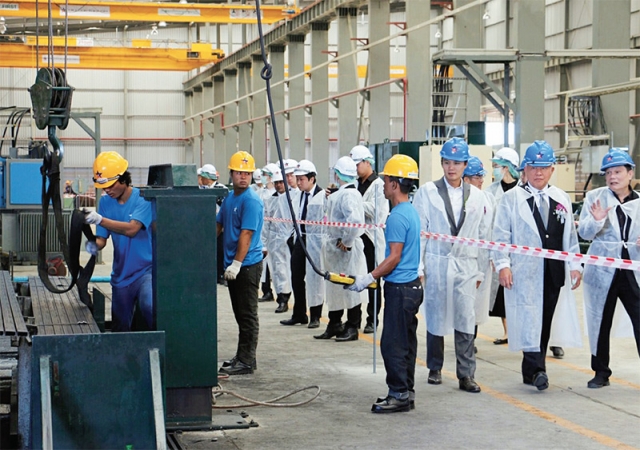
MILLCON THIHA GEL is bullish that international development banks’ planned projects in Myanmar and demand from new factories to be constructed in Thilawa Special Economic Zone will keep its newly completed steel plant busy in the very near future.
The company last week officially became the first manufacturer of industrial-grade steel products in Myanmar, being one of 20 factories in Thilawa SEZ which have started commercial operations, from a total of 78 companies having purchased land in the zone.
“JICA [Japan International Cooperation Agency], the World Bank and the ADB [Asian Development Bank) have a number of plans for Myanmar,” said Aye Thiha, president of the company, which is a 45:45:10 joint venture between Millcon Steel, General Engineering (GEL) and Yangon-based Thiha Group, respectively.
“We also eye supplying our products to factories in the SEZ. If they all start construction work now, demand will be huge,” said Sittichai Leeswadtrakul, president and chief executive officer of Thailand’s Millcon Steel.
According to the Royal Thai Embassy in Yangon, Myanmar’s construction industry is expected to experience an average annual growth rate of over 10 per cent from now until 2020.
In a paper released in June, the ADB estimates Myanmar will need US$45 billion to $60 billion (Bt1.6 trillion-Bt2.14 trillion) worth of investment in transportation projects over the next 15 years.
To the executives, Millcon Thiha GEL has made a great achievement in commencing operations after a seven-month delay.
Next year, the plant, which required a $16-million investment and employs 60 workers, will be churning out 40,000 tonnes of steel pipes and fabricated products.
While 75 per cent will initially be exported to Thailand, 100 per cent of the output is targeted to be sold domestically by 2018 at the latest.
The bright future for the joint venture is warranted, Sittichai said, highlighting the natural barriers to entry that include low-skilled labour and unclear regulations.
Located in an export-oriented zone, the facility now enjoys seven-year waivers of corporate taxes, import duties on raw materials and machinery, and commercial tax.
Shifting later to satisfy domestic demand, it will be liable to Myanmar’s 5-per-cent commercial tax, but a lot of money could be saved in other respects if no product has to be shipped overseas, the CEO said.
An advantage of being the first-comer in the sector is that the company can build up a strong relationship with wholesalers, Aye said, adding, “People don’t change suppliers often.”
Having put an enormous effort into solving licensing ambiguities over the past two years, its main challenges now are in the training of labour and know-how transfer, in order to ensure industrial-standard products are made in a country where no steel standard exists.
Meanwhile, the three partners are also looking for new business opportunities.
Steel-pipe demand in a country where the use of wood remains more popular is still low at around 20,000 tonnes per annum, but more high-rise buildings could spark demand for fabricated products that could shorten the construction period.
“In Thailand, with fabricated products, we can finish a 32-floor building in 13 months. Here, with the same height, it takes some three years [using traditional methods]. Our products could be a fast and cheap answer,” said Thitipong Tangpoonphonvivat, chief executive officer of GEL.
To Sittichai, the new plant is a crucial part of Millcon Steel’s plan to shift focus from commodity steel to value-added products.
Aside from Myanmar, it is exploring possibilities in putting up plants in other CLMV (Cambodia, Laos, Myanmar and Vietnam) countries to manufacture commodity products, while the plants in Thailand – including one in partnership with Japan’s Kobe Steel – will focus more on specialised steel products, he said.
The goal is to raise revenue from value-added products from about 10 per cent now to 40 per cent in 2020.
“The grand opening today [of Millcon Thiha GEL] is part of our success in inviting Thai investors here – and we hope to see many more,” Chainarong Keratiyutwong, charge d’affaires of the Royal Thai Embassy in Yangon, said at a ceremony attended by Myanmar and Thai guests.